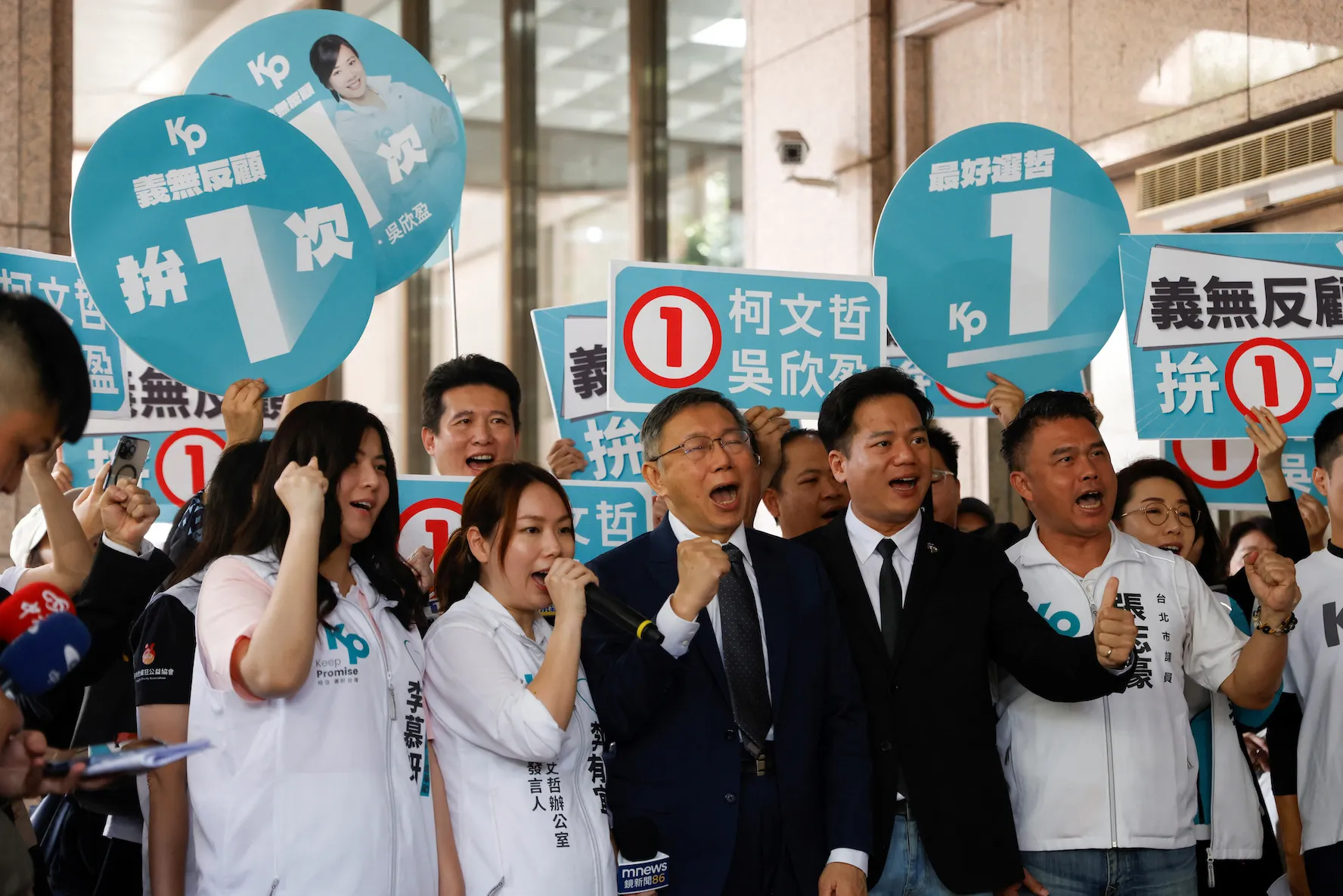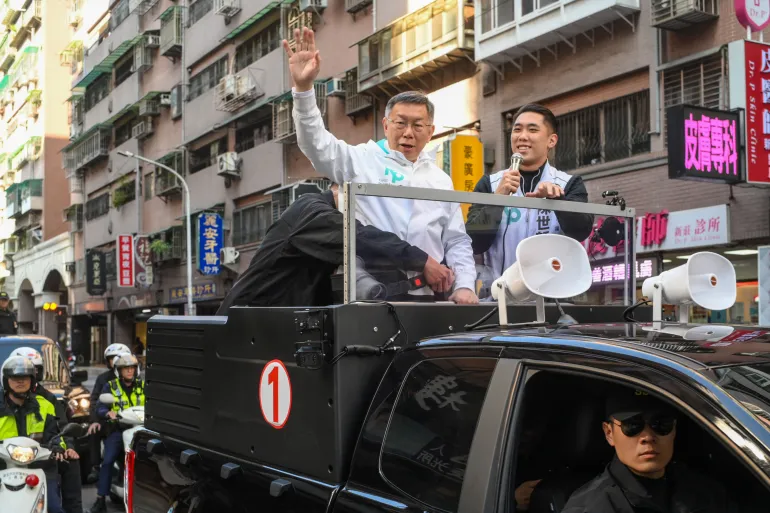Tensions Escalate As Taiwan Approaches Pivotal Presidential Election
In the lead-up to Taiwan's critical presidential election on January 13, tensions escalate as Taiwan approaches pivotal presidential election.
Author:Darren McphersonReviewer:Camilo WoodJan 09, 202410.7K Shares155.4K Views

In the lead-up to Taiwan's critical presidential election on January 13, tensions escalate as Taiwan approaches pivotal presidential election.
Chinese President Xi Jinping's New Year address, asserting the "reunification of the motherland" as a "historical inevitability," sets the stage for a high-stakes battle for regional influence between Beijing and Washington.
Front-Runner And Stakes For Regional Influence
The front-runner in this tightly contested election is current Vice President William Lai from the Democratic Progressive Party (DPP), advocating for Taipei's sovereignty and seeking to strengthen ties with the U.S., Europe, and other democracies.
His main rival, Hou Yu-ih from the Kuomintang (KMT) party, takes a more conciliatory approach toward Beijing.
Taiwan is a major producer of advanced microchips, accounting for over 90% of the global supply, which heightens the geopolitical significance of this election.
A potential regional conflict over Taiwan could have profound consequences for global security and supply chains, affecting industries from smartphones to electric vehicles.
Taiwan’s Main Political Parties
Politicians tend to ignore Taiwan's colonial history in the 20th century, when the island was under Japanese rule from 1895 to 1945. Taiwan served as a safe haven for the downed Kuomintang government following the Chinese Civil War.
Until 1987, the KMT imposed martial law and governed Taiwan as a one-party state. It was in 1986 that the Democratic Party (DPP) was established, following the emergence of a democratic movement in the 1970s.
Though numerous smaller parties have emerged in recent years, the KMT and DPP still hold sway in Taiwanese politics. The Beijing Communist Party has threatened to bring the two factions together, and President Xi Jinping has designated 2049 as the target year for the "rejuvenation of the Chinese nation."
In response to shifting voter preferences and demographics, smaller parties such as the TPP have surfaced.

Outgoing President Faces Aggression
The outgoing president, Tsai Ing-wen, has faced increased aggression from Beijing during her two terms.
In September of the previous year, the Taiwanese defense ministry reported a record number of Chinese warplanes breaching the median line of the Taiwan Strait, further escalating tensions.
The election features three main candidates: Lai from the DPP, Hou from the KMT, and a third-party contender, Ko Wen-je, leading the Taiwan People's Party (TPP).
Polls indicate a close race, with Lai holding a narrow lead over Hou, but the margin remains within the statistical margin of error.
Implications For Cross-Strait Relations
China, viewing Taiwan as a breakaway province, considers the DPP its arch-nemesis. The potential re-election of the DPP could signal a lack of public appetite for reunification, especially among the younger generation.
As the election unfolds, both Lai and Hou engage in rallies to garner support. The international community closely watches the election, recognizing its broader implications for the geopolitical landscape.
The volatile situation prompts concerns about potential military escalation. China's recent military exercises around Taiwanese airspace and waters, following visits by international figures like Nancy Pelosi, underscore the fragile nature of the cross-strait relationship.
The world anticipates the election results and their repercussions, aware that the outcome will not only shape Taiwan's future but also influence regional stability and global dynamics.
As voters head to the polls, the significance of Taiwan's contested status and its impact on democracy, security, and economic potential remains a focal point of global attention.
Final Words
The upcoming presidential election in Taiwan is a pivotal moment in the country's geopolitical landscape, with implications beyond its borders.
The conflict between pro-Beijing forces represented by Hou Yu-ih of the Kuomintang and pro-sovereignty forces under Vice President William Lai emphasizes the precarious balance in cross-strait relations.
The election's outcome, along with its potential impact on the Legislative Yuan, could significantly shape the Asia-Pacific region's geopolitical landscape.

Darren Mcpherson
Author
Darren Mcpherson brings over 9 years of experience in politics, business, investing, and banking to his writing. He holds degrees in Economics from Harvard University and Political Science from Stanford University, with certifications in Financial Management.
Renowned for his insightful analyses and strategic awareness, Darren has contributed to reputable publications and served in advisory roles for influential entities.
Outside the boardroom, Darren enjoys playing chess, collecting rare books, attending technology conferences, and mentoring young professionals.
His dedication to excellence and understanding of global finance and governance make him a trusted and authoritative voice in his field.

Camilo Wood
Reviewer
Camilo Wood has over two decades of experience as a writer and journalist, specializing in finance and economics. With a degree in Economics and a background in financial research and analysis, Camilo brings a wealth of knowledge and expertise to his writing.
Throughout his career, Camilo has contributed to numerous publications, covering a wide range of topics such as global economic trends, investment strategies, and market analysis. His articles are recognized for their insightful analysis and clear explanations, making complex financial concepts accessible to readers.
Camilo's experience includes working in roles related to financial reporting, analysis, and commentary, allowing him to provide readers with accurate and trustworthy information. His dedication to journalistic integrity and commitment to delivering high-quality content make him a trusted voice in the fields of finance and journalism.
Latest Articles
Popular Articles